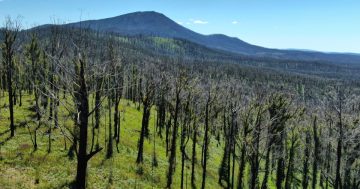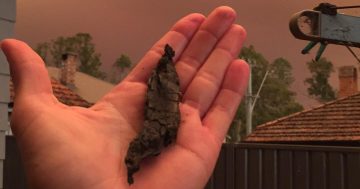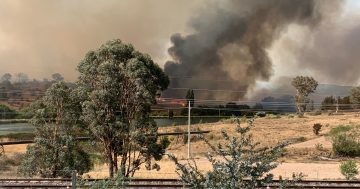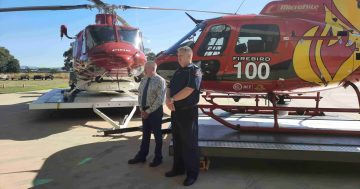
Firefighters faced some of the worst blaze conditions ever seen in Australia during the Black Summer bushfires of 2019-2020. Photo: Sydney Film Festival.
After 22 years in the fire brigade, Brett Farmer thought he’d seen it all.
However, fighting the Black Summer bushfires on the NSW South Coast in 2019-2020 was like nothing he’d experienced before.
“In 2019-2020, it was the first time I’d seen fires behaving completely differently to how they have in the past,” said Mr Farmer.
“The fire behaviour I saw then – [especially] on one particular day I speak about a bit – was the first time I’d seen fire behaviour I would expect when it’s 45 degrees and howling northwest winds and no humidity [on a] very, very mild day.”
Working to protect what he believed at the time was a “very defendable property”, things changed quickly and dramatically.
It wasn’t long before the situation completely flipped on its head. Mr Farmer believes that because the area was so dry the bushfire was able to spread far more rapidly than it would ever have spread before.
“The climate is definitely changing and, as we’ve seen, fire seasons are getting longer,” he said. “Our opportunity to do hazard reduction burns – those windows are closing a lot earlier.
“Unfortunately, this is the new normal. I don’t know how we combat it because we should be getting on top of these fires earlier.
“Going into the future, we’re going to see fire seasons like we saw then. Unfortunately, we’re going to see the loss of a lot of property and probably the loss of life, as well.”
Following the devastation of the Black Summer, the Royal Commission into National Natural Disaster Arrangements commenced soon after, and its report was released in October 2020.
The report declared that climate change has “already increased the frequency and intensity of extreme weather and climate systems that influence natural hazards”, and “what was unprecedented is now our future”.
It provided 80 recommendations, all varying in urgency, including how to approach climate issues, boosting firefighting capability, wildlife protection and community education.
However, a year later many of these recommendations are yet to be adopted.
For Mr Farmer, it’s disheartening.
“At the end of the day, we’re putting our lives on the line, and we expect our employer will do the best to look after us,” he said. “If there are recommendations, they need to be acted on as soon as possible to make sure we’re as safe as possible.”
Former Deputy Commissioner of Fire and Rescue NSW Jim Smith echoed this sentiment about the South Coast bushfires, and pleaded for the Federal Government to follow the recommendations of the report.
“As an active Rural Fire Service volunteer on the NSW South Coast, we don’t think much has changed since the fires of 2019-2020,” he said.
“Not much seems to have been done and we don’t feel any safer than we did before.
“Many people are living in fear of the next fire. Without emissions reductions this decade it’s just going to keep getting worse. At the very least, every recommendation of the royal commission should be implemented.”
Climate Council CEO Amanda McKenzie said the one-year mark since the report was released is a timely reminder for Prime Minister Scott Morrison as he attends the COP 26 UN Climate Change Conference in Glasgow, Scotland.
“Emissions must plummet this decade to tackle the root cause of extreme fires: climate change,” she said. “The royal commission showed that climate change is fuelling longer, hotter and more dangerous bushfire seasons and other extreme weather events.
“Prime Minister Scott Morrison’s commitment to net-zero is meaningless without policies to cut emissions this decade. Even with this newly announced target, Australia ranks dead last on climate when compared to other developed nations.”
















